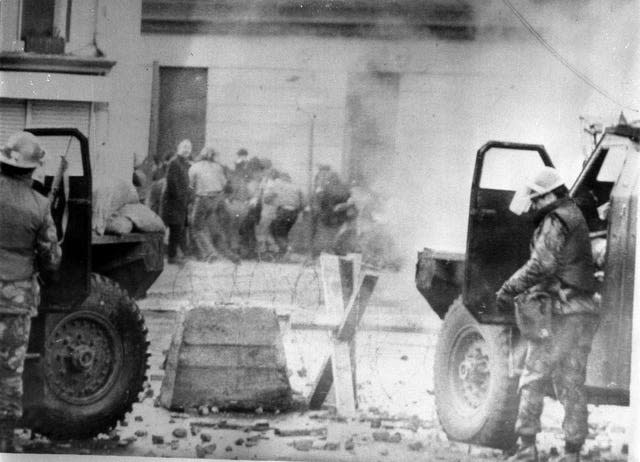No prosecutions over allegations of false evidence at Bloody Sunday Inquiry
Sixteen people will not be prosecuted over allegations of giving false evidence to the Bloody Sunday Inquiry, the Public Prosecution Service (PPS) in Northern Ireland has said.
The decisions relate to 15 former soldiers and one former alleged member of the Official IRA.
The PPS has said there was no reasonable prospect of securing a conviction in the cases.
Regarded as one of the darkest days of the Troubles, 13 people were killed when paratroopers opened fire on a crowd taking part in a civil rights march in Londonderry on January 30 1972.
The Bloody Sunday Inquiry, headed by judge Lord Saville, was announced by former prime minister Tony Blair in 1998 and delivered its findings in 2010 that there was no justification for shooting any of those killed or wounded.
Following the inquiry, the Police Service of Northern Ireland (PSNI) submitted an investigation file to the PPS in relation to allegations of murder and attempted murder against a number of people.

One soldier, known as Soldier F, is facing prosecution accused of two murders and five attempted murders on Bloody Sunday.
The PPS had previously said consideration would also be given as to whether the test for prosecution was met in respect of allegations that those reported had given false evidence in connection with the Bloody Sunday Inquiry.
It said its prosecution team has now determined that the available evidence is insufficient to provide a reasonable prospect of conviction of any suspect considered.
PPS senior public prosecutor John O’Neill said: “All decisions on whether or not to prosecute are taken by independently and impartially applying the test for prosecution.
“The standard of proof needed for a criminal prosecution is high.
“For a conviction, the prosecution must establish beyond a reasonable doubt, through available and admissible evidence, the commission of a criminal offence by the suspect.
“After careful consideration, it has been concluded that the available evidence in this case is insufficient to provide a reasonable prospect of obtaining a conviction of any suspect for offences in relation to the giving of false evidence.”
Mr O’Neill added: “The decision making involved the consideration of a vast amount of material.
“Consideration of the allegations of false evidence presented particularly complex evidential and legal issues, all of which were thoroughly analysed by the prosecution team.”
The PPS said three particular issues arose during its considerations:
– While the Bloody Sunday Inquiry may have rejected the evidence of some individuals, the PPS said it did not always express those findings in terms amounting to criminal standard of proof.
– The PPS concluded that accounts of events given by soldiers in 1972, which were rejected by the inquiry, would not be admissible in criminal proceedings today.
– The full amount of evidence upon which the Bloody Sunday Inquiry based its findings is not available to prosecutors.
Mr O’Neill said: “I wish to make clear that these decisions not to prosecute in no way undermine the findings of the Bloody Sunday Inquiry that those killed or injured were not posing a threat to any of the soldiers.
“We acknowledge that these prosecutorial decisions will be disappointing to the victims and families involved, and that this may be another difficult day for them.
“We have written to them to explain in detail the reasons for the decisions.
“We would like to provide assurance that these decisions were taken impartially, independently and only after the most thorough and careful consideration of all available evidence and the relevant legal issues.”
Thirteen people were killed on Bloody Sunday and another man shot by paratroopers died four months later.
Many consider him the 14th victim of Bloody Sunday but his death was formally attributed to an inoperable brain tumour.

 Yahoo News
Yahoo News 

